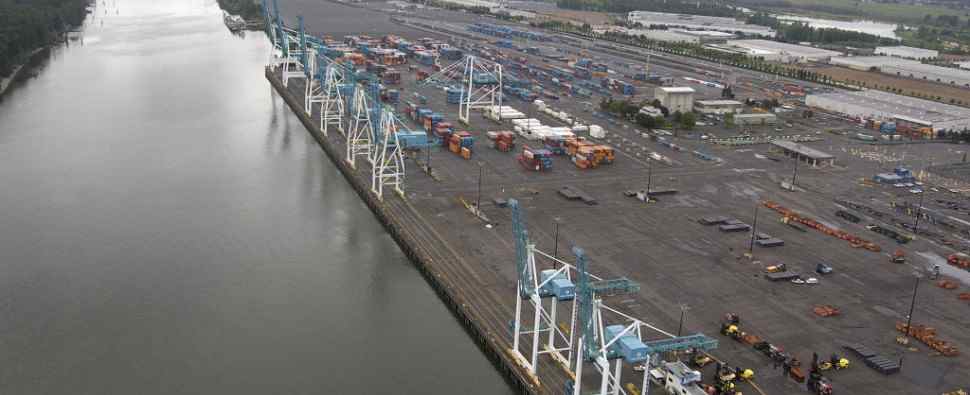forum
library
tutorial
contact

Port of Portland Must Diversify at
Troubled Container Terminal, Study Shows
by Staff
Transport Topics, January 11, 2018
|
the film forum library tutorial contact |

|
Port of Portland Must Diversify at
by Staff
|
 A comeback is unlikely at the Port of Portland's container terminal unless other lines of marine shipping business are found to subsidize it, a Port consultant found.
A comeback is unlikely at the Port of Portland's container terminal unless other lines of marine shipping business are found to subsidize it, a Port consultant found.
Advisian WorleyParsons, a global consultancy, is expected to tell the Port's governing board Jan. 10 that the troubled Terminal 6 isn't likely to see a return of the weekly, trans-Pacific container service by multiple carriers it enjoyed just a few years ago.
Instead, the port should cultivate a mixed-use terminal that handles breakbulk cargo -- items shipped as separate pieces -- as well as standardized containers.
The report also recommends outsourcing some of the operations of the terminal to a contractor, but not going so far as to lease it to an operator, as it did in recent years to ICTSI Oregon.
Consolidation among shipping companies and the increasing size of oceangoing vessels puts the terminal in a poor position to compete with so-called mega-ports up and down the West Coast, the consultants said.
The port already took steps toward a mixed-use operation. Swire Shipping, the Singapore company that announced in November it would call on the Port of Portland's container terminal every 35 days beginning this month to carry Western Star trucks, manufactured by Daimler in Portland, to Australia. It will also carry containers filled with agricultural goods and other exports from Portland to Asian ports.
The mixed-cargo vessels would allow the port to break even with less business than a container-only terminal.
But it would still give Oregon companies that ship containerized products a more direct connection to Asian ports, rather than forcing them to ship through ports in the Puget Sound or California.
The Port has also partnered with BNSF Railway to create a rail feeder line from Terminal 6 to terminals in the Seattle-Tacoma area, where they can be loaded onto ocean vessels and shipped overseas.
Even with a mix of uses, it could still be difficult to attract enough business to break even, the consultants warn. It would require a level of activity -- 148,000 pieces of cargo moved on or off a ship each year -- that the terminal has only seen once in the last decade.
The Port in 2010 signed a 25-year lease with International Container Terminal Services, or ICTSI. The Port sought to stem losses from operating the container terminal by offloading the risk to the private business.
The Philippines-based company clashed almost immediately with the International Longshore and Warehouse Union, whose members offload cargo in West Coast ports and which claimed jurisdiction over jobs that had traditionally belonged to union electricians who worked for the Port.
That led to work slowdowns and protracted court battles that continue to this day. By June 2016, all three shipping lines that called at the port had suspended service.
The Port and ICTSI agreed last year to split, leaving the Port to start the process of rebuilding business at the terminal.
Related Sites:
Terminal 6 Business Study Executive Summary Advisian, January 2018
Related Pages:
Here's Why Portland Won't Get New Shipping Container Service Anytime Soon by James Cronin, Portland Business Journal, 5/9/16
learn more on topics covered in the film
see the video
read the script
learn the songs
discussion forum
